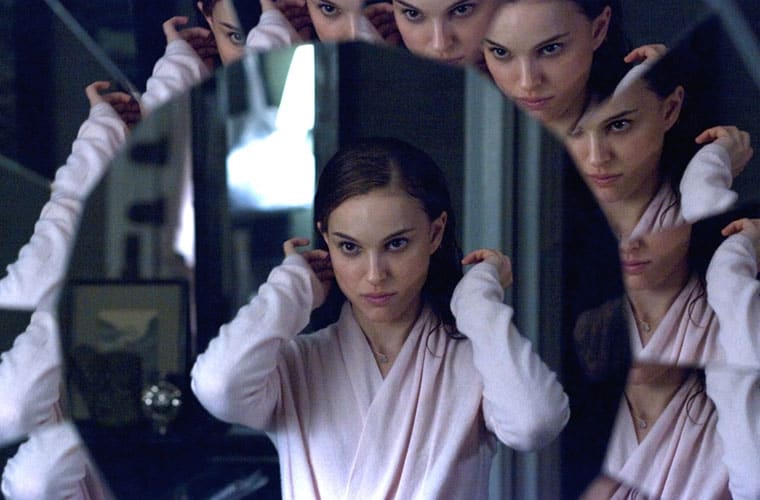The ‘Black Swan’ actress scores a dual role unlike any other she’s played before.
Natalie Portman has enjoyed a varied career as she transitioned from precocious child actress to Academy Award winner. Amid manic pixie dream girl performances and misguided attempts at stoner comedies and historical dramas, she has thankfully still made the most of some truly phenomenal roles.
When Portman finally won an Oscar for her psychologically tormenting performance in Darren Aronofsky’s Black Swan, it would then take more than half a decade for her similarly mesmerizing turn as Jacqueline Kennedy in Pablo Larrain’s Jackie to see the light of day. Obviously, the Thor movies existed in the interim and Jane Foster deserves some love in the MCU. However, Portman was made for better things than playing a love interest, and we waited patiently for her next awards contender.
A good Portman project is worth all of these intermissions, though, and wait times between each movie may even be shrinking — after all, Jackie was followed by Annihilation just a couple of years later. As Portman continues signing on for a number of fascinating projects as well, one might begin to hope that her career is leveling out in a good way.
Portman’s latest announced project signals that she is ready to dive headfirst into more big screen challenges. She’s about to return to her Oscar-winning roots by playing a dual role. Back in July, Portman first entered talks to star in an untitled movie based on the writers of the iconic “Ask Ann Landers” and “Dear Abby” advice columns. The Hollywood Reporter has since confirmed that the film is a go. Portman is set to do double duty as actor and director on the film, too, making this her sophomore feature after the Israeli drama A Tale of Love and Darkness.
From a script by The Affair writer Katie Robbins, Portman will play identical twin sisters Esther and Pauline Friedman, who had an acrimonious relationship with one another throughout their personal and professional lives. Although they were close in their youth, an air of competitiveness developed over the years that caused a falling out between them.
The women are best known for penning competing advice columns that each won audiences over in spades. Esther had a bit of a head start, winning the job as the “Ask Ann Landers” writer via a contest and debuting at the Chicago Sun-Times in October 1955. Pauline was close behind with her own original column “Dear Abby,” which launched in January 1956 at the San Francisco Chronicle.
The sisters handled their respective columns with humorous (and imperfect) candor, despite the fact that they often tackled subject matter that was taboo for the era. Their approach to topics such as alcoholism, teenage pregnancy, infidelity, and gay identity included witty one-liners and common-sense answers that were widely revered. According to Life, they were “the most widely read and most quoted women in the world.”
Amid their success, Esther and Pauline often clashed throughout their careers, even going so far as to work for rivaling papers and cease communication with one another. Eventually, after years of estrangement, they openly put their feud to bed in the mid-1960s.
In spite of the Friedman sisters’ outwardly similarities — both appearance and ambition-wise — some real differences and nuances are present beneath the surface. Jeanne Phillips, Pauline Friedman’s daughter and current author of the “Dear Abby” column, once offered a sliver of insight into her mother and aunt’s motivations in a response to a letter in July 2017:
“My mother and my aunt were identical twins. Like you, they shared a room and slept in the same bed for many years. Their parents dressed them alike and gave them names that were mirror images (Pauline Esther and Esther Pauline). […] my aunt yearned to be an individual. My mother loved the attention that being a twin brought. This created serious conflict for them later in life.”
Modulating those very subtleties between both twins’ conflicting desires would be a great challenge for any actor to dabble in. For Portman specifically, it would mark a different kind of dual role for her to work with. As captivating as she is in Black Swan, the role of Nina Sayers is not particularly understated, and she only becomes increasingly overblown the more she spirals out of control.
The one other time Portman portrayed two people in a single film was in Miloš Forman’s Goya’s Ghosts. Once again, her roles are glaringly obvious in their polarities. Unfortunately, this time, Portman’s performances are also wrapped up in a stilted, emotionally empty historical drama, and the overall movie fell far short.
However, the right orchestrators behind the camera clearly have the propensity to change our receptiveness to Portman’s dramatic fearlessness. One wonders how Portman’s own influence as director will affect the Friedmans’ stories, especially when her sole attempt at helming a feature has thus far been an ambitious passion project. A Tale of Love and Darkness isn’t necessarily a bad directorial debut, but it is ultimately too wrapped up in aesthetic metaphor and suffers from a meandering plot, eventually becoming much less emotionally rendering than it aims to be.
At the very least, Portman’s eye for emotionally-driven imagery was allowed some legroom of experimentation throughout A Tale of Love and Darkness. Applying it to the Friedman twins’ story could make for a unique approach to the biographical material, as long as the film isn’t as abstract. Furthermore, Robbins’ writing on The Affair has been an asset to the series’ fourth season. She handles the delicacies of the show’s signature subjectivities very well, which is a necessary skill when dealing with such strong personalities as Esther and Pauline Friedman.
We love it when women in history get to have their stories told. And luckily for us, Portman and Robbins seem prepared to shepherd a worthy biographical film to add to that mix.

